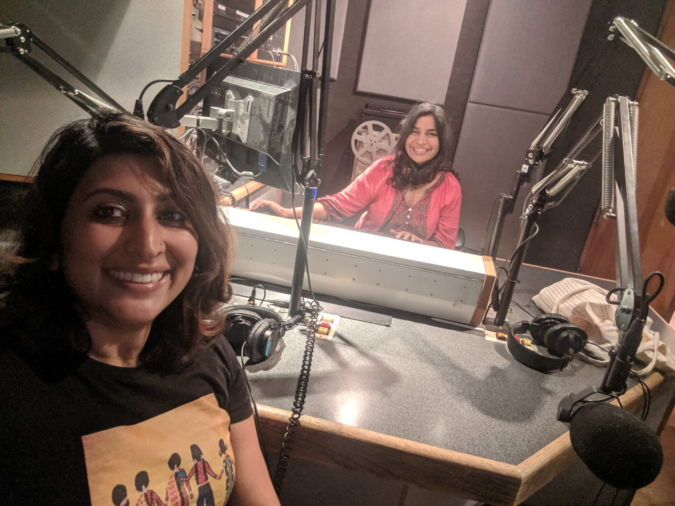Labor studies students engage with UCLA Labor Center women-led storytelling podcast that promotes social change
Vanessa Codilla | March 2, 2022
Labor studies students enrolled in a course focused on work and social justice learn about how art is used to express people’s struggles, their critiques of society and their cultural backgrounds and personal identities — so a lecture on a popular labor podcast produced by the UCLA Labor Center was a natural fit.
As labor studies professor and UCLA Labor Center Project Director Janna Shadduck-Hérnandez prepared her list of guest speakers for Labor Studies 152: Work, Social Justice, and Arts, she invited Re:Work Radio’s producers, the Labor Center’s Director of Communications Veena Hampapur and Research Director Saba Waheed to discuss their women-led podcast which spotlights the voices of workers, immigrants and communities of color to a recent class lecture.
During the class session, titled “Mobilizing Workers through Radio and Film” in the course syllabus, Hampapur and Waheed shared intentions behind the podcast, their creative process and insights on the role of storytelling in social justice.
As a Former Visual Communications Armed With a Camera (AWC) Fellow who earned a doctorate in sociocultural anthropology at UCLA, Hampapur shared how her background in filmmaking for advocacy and education is transferable to the field of podcasting, especially now with increasingly blurred boundaries between different art mediums such as video and audio.
Waheed, a UCLA labor studies faculty member with over 20 years of research experience in workers’ issues including gig workers, nail salon workers and LGBTQ+ grocery workers, among others, shared that combining research with media is a powerful tool for communication.
“Re:Work is a storytelling show that features stories that rethink work,” said Waheed. Rather than an interview-style podcast that informs listeners of broad labor issues, Re:Work Radio is “driven by stories as an entryway to talk about issues people experience,” she added.
During the lecture, Hampapur and Waheed played audio snippets from episodes Stranded, about a migrant worker experiencing India’s humanitarian crisis following the COVID-19 public health emergency in 2020, and The Gig’s Up, about a rideshare driver’s daily struggles in the gig economy.
“I feel like a lot of us get stuck in our own ways and our idea of what work looks like because we’re not necessarily exposed to these other sectors of life or these different areas in the world,” said first year transfer student and sociology major Qianyi Loo after the lecture. “And so storytelling is a great way to humanize these experiences, and to show that just because [circumstances in the workplace] may be good for you, doesn’t mean that [they’re] good for everyone.”
Third year labor studies minor Ruth Rodriguez shared that she is drawn to podcasting as an accessible and educational art form with less jargon than discussions in academic spaces. Familiar with the medium herself as a radio team member for UCLA’s La Gente Newsmagazine, Rodriguez described podcasts as a form of oral history that “connects you to your roots.”
For second year political science major and community engagement and social change minor Arianah Rizzo, understanding social issues involves hearing directly from others. “In the news, a lot of times we see different stuff come on about workers or unionizing or striking, but we don’t hear the individual stories about why one individual who’s at that mobilizing effort is doing what they’re doing. I think that is often left out.” said Rizzo. “And I think if we were [to hear] those stories, it would allow a lot more people to connect and be open to supporting a movement.”
To culminate the course, students will develop and present their own arts-inspired project that will present the work of Los Angeles worker organizations. Students will choose an arts medium of their choice, including podcasts, films and performances, to showcase the campaigns and goals of their chosen organization.
Shadduck-Hernandez integrated participatory photography in her own doctoral work as an artistic medium for young workers to discuss their home, school and community life. She has also used the method of photo-voice as a basis for research with day-laborers, garment workers and other working class communities.
“This course offers students a unique opportunity to explore how workers, their communities and artists have engaged in the creative expression to develop alternative narratives that uplift the stories and histories of working people in the US today and in the past,” said Shadduck-Hernandez, who has taught similar courses at UCLA’s Department of World Arts and Culture and the University of Massachusetts Amherst.
To learn more about Re:Work Radio and to listen to more episodes, visit reworkradio.org.
Labor Studies 152: Work, Social Justice, and Arts is offered every Winter Quarter.


